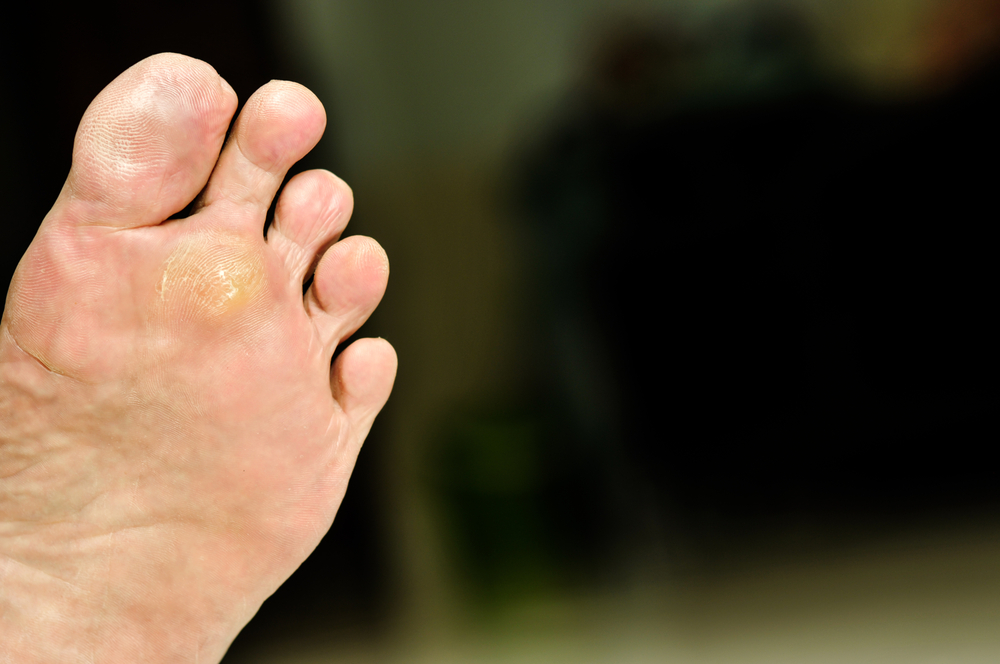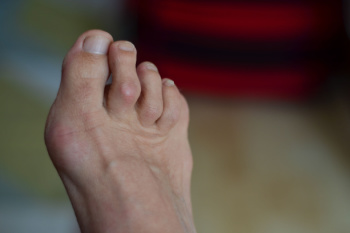
Choosing the correct shoe fit is both an art and a science. It begins with matching the shoe shape to the natural form of your foot, ensuring the shoe follows your foot’s contour. Size is also key, and it is best determined by the length of the arch rather than simply by toe position. A well-fitting shoe should allow the first metatarsal joint, the base of the big toe, to sit in the shoe’s widest area. For maximum comfort, look for lightweight shoes with soft midsoles and gently curved rocker soles. These features tend to feel better for everyday wear. Flexibility in the sole, internal shoe temperature, and insoles can affect comfort, although these factors may vary based on individual needs and activities. Ultimately, a good fit supports foot health and enhances comfort, helping you stay active and pain-free. If you want assistance in selecting the right shoe fit for you, it is suggested that you reach out to a podiatrist for guidance.
Getting the right shoe size is an important part of proper foot health. Seek the assistance of one of our podiatrists from Lovely Foot Associates, PC. Our doctors will provide the care you need to keep you pain-free and on your feet.
Getting the Right Shoe Size
There are many people who wear shoes that are the incorrect size, negatively affecting their feet and posture. Selecting the right shoes is not a difficult process, so long as you keep several things in mind when it comes to choosing the right pair.
As our feet hold our body weight and keep us moving, it is important to treat them right. Picking the right pair of shoes can provide your feet comfort and mobility without pain.
If you have any questions, please feel free to contact our office located in Johnstown, PA . We offer the newest diagnostic and treatment technologies for all your foot care needs.

In diabetic foot care, selecting the right wound dressing is vital to aid healing and prevent infection. Dressings protect the wound and cater to specific ulcer needs. Non-stick dressings are gentle on delicate skin, preventing adherence that could cause irritation. For wounds with heavy fluid, foam and gel dressings are excellent for absorbing excess moisture. Hydrogels help with the natural breakdown of dead tissue, making them suitable for wounds with dry, necrotic areas. Antimicrobial dressings with iodine or silver help reduce infection, although sealed dressings are not recommended if an infection is present, as they can trap bacteria. Dressings should be changed frequently, particularly in highly draining ulcers, to prevent skin breakdown surrounding the wound. If you have a diabetic foot wound, it is strongly suggested that you schedule an appointment with a podiatrist who can examine your wound, and recommend the best dressing choice for your ulcer’s condition.
Wound care is an important part in dealing with diabetes. If you have diabetes and a foot wound or would like more information about wound care for diabetics, consult with one of our podiatrists from Lovely Foot Associates, PC. Our doctors will assess your condition and provide you with quality foot and ankle treatment.
What Is Wound Care?
Wound care is the practice of taking proper care of a wound. This can range from the smallest to the largest of wounds. While everyone can benefit from proper wound care, it is much more important for diabetics. Diabetics often suffer from poor blood circulation which causes wounds to heal much slower than they would in a non-diabetic.
What Is the Importance of Wound Care?
While it may not seem apparent with small ulcers on the foot, for diabetics, any size ulcer can become infected. Diabetics often also suffer from neuropathy, or nerve loss. This means they might not even feel when they have an ulcer on their foot. If the wound becomes severely infected, amputation may be necessary. Therefore, it is of the upmost importance to properly care for any and all foot wounds.
How to Care for Wounds
The best way to care for foot wounds is to prevent them. For diabetics, this means daily inspections of the feet for any signs of abnormalities or ulcers. It is also recommended to see a podiatrist several times a year for a foot inspection. If you do have an ulcer, run the wound under water to clear dirt from the wound; then apply antibiotic ointment to the wound and cover with a bandage. Bandages should be changed daily and keeping pressure off the wound is smart. It is advised to see a podiatrist, who can keep an eye on it.
If you have any questions, please feel free to contact our office located in Johnstown, PA . We offer the newest diagnostic and treatment technologies for all your foot care needs.

Warts on the feet, particularly plantar warts, are a common skin condition caused by the human papillomavirus, HPV. These warts occur when the virus enters the skin through tiny cuts, breaks, or weak spots, often on the soles of the feet. This virus thrives in warm, moist environments, making public places like swimming pools, locker rooms, and communal showers prime locations for spreading HPV. Walking barefoot in these areas can increase the risk of contracting plantar warts. Plantar warts often appear as small, rough, and grainy lesions, typically on weight-bearing areas such as the heels or balls of the feet. Unlike other types of warts, plantar warts tend to grow inward due to pressure from walking or standing, which can cause a flat appearance and make them difficult to detect at first glance. These warts may have tiny black dots within them, which are small, clotted blood vessels. If you have this type of wart on your foot, it is suggested that you schedule an appointment with a podiatrist for an accurate diagnosis and treatment.
Plantar warts can be very uncomfortable. If you need your feet checked, contact one of our podiatrists from Lovely Foot Associates, PC. Our doctors will assist you with all of your foot and ankle needs.
About Plantar Warts
Plantar warts are the result of HPV, or human papillomavirus, getting into open wounds on the feet. They are mostly found on the heels or balls of the feet.
While plantar warts are generally harmless, those experiencing excessive pain or those suffering from diabetes or a compromised immune system require immediate medical care. Plantar warts are easily diagnosed, usually through scraping off a bit of rough skin or by getting a biopsy.
Symptoms
Treatment
To help prevent developing plantar warts, avoid walking barefoot over abrasive surfaces that can cause cuts or wounds for HPV to get into. Avoiding direct contact with other warts, as well as not picking or rubbing existing warts, can help prevent the further spread of plantar warts. However, if you think you have developed plantar warts, speak to your podiatrist. He or she can diagnose the warts on your feet and recommend the appropriate treatment options.
If you have any questions please feel free to contact our office located in Johnstown, PA . We offer the newest diagnostic and treatment technologies for all your foot and ankle needs.

Hammertoe is a foot condition characterized by the abnormal bending of one or more toes, typically affecting the second, third, or fourth toes. This deformity often develops due to muscle imbalances, genetics, or wearing tight shoes that restrict toe movement. Over time, the affected toe bends at the middle joint, leading to discomfort. Common symptoms include pain, swelling, and difficulty wearing shoes. Individuals may also notice calluses or corns forming on the top of the bent toe or on the ball of the foot due to friction. Early relief options include wearing properly fitting shoes and using orthotic inserts, but persistent symptoms or worsening deformity may require medical intervention. A podiatrist may recommend targeted exercises, custom orthotics, or, in more severe cases, surgery to realign the toe. If you are experiencing symptoms of hammertoe, it is suggested that you schedule an appointment with a podiatrist for a comprehensive evaluation and effective treatment options tailored to your needs.
Hammertoe
Hammertoes can be a painful condition to live with. For more information, contact one of our podiatrists from Lovely Foot Associates, PC. Our doctors will answer any of your foot- and ankle-related questions.
Hammertoe is a foot deformity that affects the joints of the second, third, fourth, or fifth toes of your feet. It is a painful foot condition in which these toes curl and arch up, which can often lead to pain when wearing footwear.
Symptoms
Causes
Genetics – People who are genetically predisposed to hammertoe are often more susceptible
Arthritis – Because arthritis affects the joints in your toes, further deformities stemming from arthritis can occur
Trauma – Direct trauma to the toes could potentially lead to hammertoe
Ill-fitting shoes – Undue pressure on the front of the toes from ill-fitting shoes can potentially lead to the development of hammertoe
Treatment
Orthotics – Custom made inserts can be used to help relieve pressure placed on the toes and therefore relieve some of the pain associated with it
Medications – Oral medications such as anti-inflammatories or NSAIDs could be used to treat the pain and inflammation hammertoes causes. Injections of corticosteroids are also sometimes used
Surgery – In more severe cases where the hammertoes have become more rigid, foot surgery is a potential option
If you have any questions please contact our office located in Johnstown, PA . We offer the newest diagnostic and treatment technologies for all your foot and ankle needs.